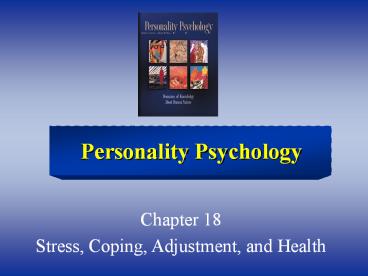Personality Psychology Chapter 18 Stress, Coping - PowerPoint PPT Presentation
1 / 24
Title:
Personality Psychology Chapter 18 Stress, Coping
Description:
Personality Psychology Chapter 18 Stress, Coping, Adjustment, and Health Recent research studies have concluded that someone who is Type A isn t necessarily doomed ... – PowerPoint PPT presentation
Number of Views:183
Avg rating:3.0/5.0
Title: Personality Psychology Chapter 18 Stress, Coping
1
Personality Psychology
Chapter 18 Stress, Coping, Adjustment, and Health
2
Health Psychology
- Does personality type really predispose us to
disease? - Do people with various illnesses develop some of
the same personality traits? - How do stress and trauma affect personality?
- How do our personalities influence the ways in
which we handle stress and trauma?
3
Health Psychology
- Type A Behavior Pattern (TABP)
- Type B Behavior Pattern (TBBP)
- Type C Behavior Pattern (TCBP)
4
Personality and Cardiovascular Disease
- Type A Behavior
- (Friedman and Rosenman, 1974)
- A syndrome of several traits
- Achievement motivation and competitiveness
- Time urgency
- Hostility and aggressiveness
5
Personality and Cardiovascular Disease
- Type A Behavior
- Early research found a relationship between Type
A and risk for heart attack - Later research couldnt replicatewhy?
- What part of Type A is most lethal?
6
Personality and Cardiovascular Disease
Hostility
- Is it the specific trait of Hostility, rather
than the general syndrome of Type A, that is a
better predictor of heart disease?
7
Personality and Cardiovascular Disease
- Hostility
- The toxic-core
- Most significant feature for risk of heart
disease and mortality - Explosive reaction to stress
- Some theorists distinguish from Type A and call
Type H - More noncompliant with medical advice
8
Personality and Cardiovascular Disease
- How Are the Arteries Damaged by Hostility?
- Flight or fight increases blood pressure
- More blood going through small arteries
- Arteriosclerosis
9
Personality and Disease
Type B The absence of Type A behaviors more
relaxed and laid-back
10
Personality and Disease
- Type C
- Cancer-prone personality
- Suppression of emotion
- Compliant and conforming
- Arousal ? Heightened activity ? No outlet ?
Remain in state of heightened activation ?
Reduction of immune system functioning ? Greater
vulnerability to disease
11
Coping Strategies and Styles
- Disclosure and Telling Secrets
- Keeping things to ourselves can be a source of
stress - Getting something off your chest can be a
relief from stress which can benefit your health
12
Models for Personality Behavior Patterns
13
Models for Personality Behavior Patterns
14
Models for Personality Behavior Patterns
15
Models of Personality-Illness
- Interactional Model
- Transactional Model
- Health Behavior Model
- Predisposition Model
- Illness Behavior Model
16
Two kinds of appraisal in the Transactional Model
- Primary and Secondary Appraisal
- Primary Appraisal person perceives that the
event is a threat - Secondary Appraisal person concludes that they
dont have resources to cope with the threatening
event
17
Coping Strategies and Styles
- Attribution Style
- The dispositional way of explaining the causes of
bad events - External vs. Internal
- Unstable vs. Stable
- Specific vs. Global
18
Coping Strategies and Styles
- Optimism and Physical Well-Being
- Optimistic appraisal has been shown to predict
- Good health
- Immune system functioning
- Faster rehabilitation
- Living longer
19
The Concept of Stress
- A subjective feeling that is produced by
uncontrollable and threatening events - Must have both primary and secondary appraisal to
qualify as stress - Stressors
- Extreme in some manner
- Produce opposing tendencies
- Are outside of our power to influence
20
The Concept of Stress
- Daily Hassles
- Minor sources of stress in most peoples lives
are termed daily hassles - Like major events, people with a lot of minor
stress suffer more than expected from
psychological and physical symptoms
21
The Concept of Stress
- Major Life Events
- Point system of determining stress levels
- Most points most likely to have a serious
illness
22
When is Stress Overwhelming?
- The Stress Response
- When the body endures a prolonged Flight or
Fight response - General Adaptation Syndrome
- Alarm
- Resistance
- Exhaustion
- Breakdown in immune functioning, strength of
cardiovascular system
23
Trauma and Personality
- Definition of trauma
- Those at increased risk for slow post-trauma
recovery - Outside factors
- Personality factors
24
Coping with trauma
- Coping and personality characteristics
- Pennebakers research on illness support groups
- Changes in personality due to trauma
- Tedeschis research on post-traumatic growth
- Coping strategies
- Changing attribution style
- Disclosure Pennebakers research
- Managing emotions

